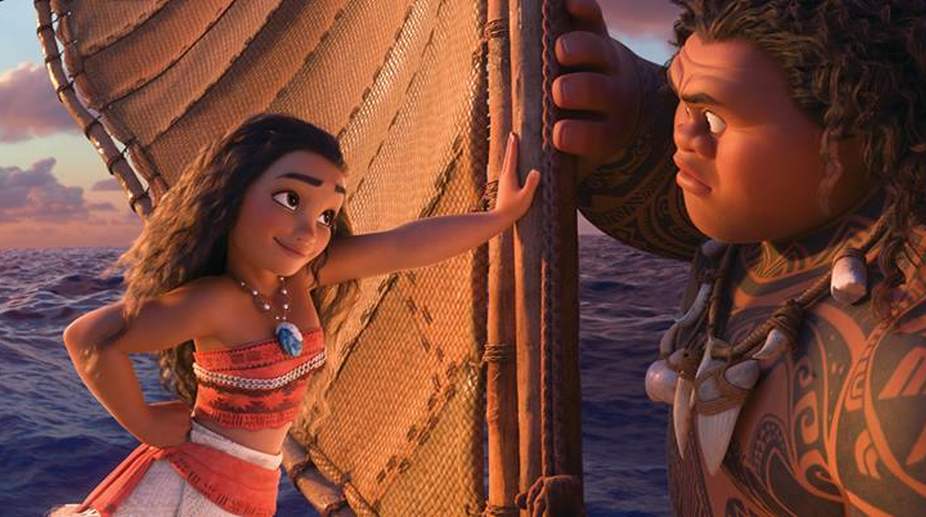‘Moana’ live-action remake set with Dwayne Johnson returning
Hollywood star Dwayne Johnson announced a new live-action remake of 'Moana' during the Disney shareholders meeting on April 3.

Moana (PHOTO: Facebook)
The "once-upon-a-time" and "happily-ever-after" fairytales that children and young adults are heavily fed on while growing up have often reinstated patriarchal notions and gender stereotypes: the princess is almost always "slender, fair, and delicate" and forever awaits her prince charming. A trickle of new animated films are attempting to change this narrative in today's politically correct and gender-neutral times.
Walt Disney Animation Studio's Moana, which hit the screens in 2016, is one such story. Moana is a feisty young girl who, despite her father's best efforts, embarks on a daring mission to save her people on her island. She meets the once-powerful demigod Maui, who, after casting doubts on her ability to be on such a risky adventure, finally guides her in her quest.
Moana is unlike the other Disney princesses. She does not wait for someone else, much less a "prince charming", to rescue her when she is faced with monsters in the ocean. She does all the slaying and the voyaging by herself.
Advertisement
Frozen, yet another Walt Disney production, was again female-centric and was a blockbuster hit when it was released in 2013. A story of two sisters, this tale hands over the rescue operation to the young Ana, who is determined to bring back her elder sister, Elsa, from her self-imposed exile after she set off an unending winter because of mishandling her magical powers.
What takes the cake, though, is the answer to the quintessential question: What is the act of true love that will save the dying princess? No, not a "true love's kiss". The story leads the young audience — and the rest like us — to push the boundary of "true love" beyond what may exist between a man and a woman in a romantic relationship.
But what difference does that make, do you ask? It's just fiction! "Any movie that's relatable impacts children," says author Vani Mahesh who has recently written an Indian mythology-based comic book for the famous Amar Chitra Katha publisher. "When a girl watches another girl being fearless, it naturally evokes the same emotions in her. Autobiographical movies, like Dangal, probably have an even higher impact because kids can see their icons in action."
Clinical psychologist Debasmita Phukan agreed, saying that gender stereotypes begin to be acquired by the age of five. "By the time a child reaches adolescence, what society considers 'appropriate' or 'inappropriate' with respect to a certain gender is well understood," she said.
In a fast-evolving society where children have ready information at the click of a button, 32-year-old Anushree Vaidya carefully chooses the TV and movie content her three-year-old daughter is exposed to. "I don't want my daughter to be caged within stereotypes — that a girl must be fair and demure. I want her to grow up as a strong individual, and since at this age it's usually cartoons that they idolise, I choose our movie content accordingly," the young mom said.
It's pertinent to point here that it's not just young girls who get influenced by gender stereotyping through stories — be it through movies or books. Boys are equally impacted.
"When a patriarchal society leads a child to believe that girls are helpless and demure, and boys are 'manly' only if they are bulky and get into fights, stories like Sleeping Beauty and Snow White only reinforce these stereotypes, thereby perpetuating patriarchy," Debasmita added.
"And patriarchy is dehumanising and discriminating to men too," said feminist activist, poet and author, Kamla Bhasin. "Boys are discouraged from crying from an early age — tears are seen as a sign of weakness — and are made to believe that they are protectors of women, as a result of which their emotional intelligence can be left deeply wanting. In some cases this can lead to difficulty in accepting rejection and deep-seated frustration."
There has, however, been some change in mindsets which is reflected in the movies that are being made now. If one were to trace Walt Disney's movies, the early Disney princesses were the typical damsels-in-distress, like Cinderella, Sleeping Beauty, and Snow White who could not get themselves out of their own problems. As feminism rose in America, Disney reinvented its princess with The Little Mermaid in the 1980s — rebellious and ambitious, who married her true love. Then came Pocahontas who stood for herself, and Mulan who fought off an entire army to save her country.
Similarly, in a society which considers cooking and dancing to be essentially feminine actions, Ratatuoille and Happy Feet welcomed the thought that passion does not have a gender and that it's ok to be different.
A Whatsapp video doing the rounds recently showed a young mother being pulled into an "intervention" by Cinderella, Sleeping Beauty and Snow White.
"It's 2017," the trio said, "Don't you think it's time you stop reading such stories to your child… these stories have just been lazy misinterpretations and propaganda by male writers." Then what do I read to my child, asks the mother. "Tell her real stories, of real-life heroes like Madam Curie and Kalpana Chawla." The video was a fictional set-up, but the suggestions? Take your pick.
Advertisement